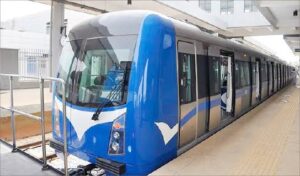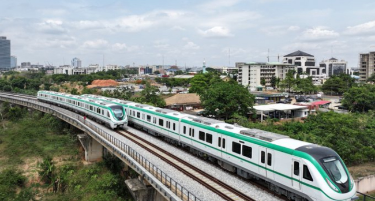The Abuja Rail Mass Transit, specifically Phase 1, has made a significant impact in its first 100 days of operation, transporting over 250,000 passengers. This milestone highlights the growing importance of the rail system in Nigeria’s capital, Abuja, in easing traffic congestion and providing a more efficient mode of transport for residents and visitors alike.
The China Civil Engineering and Construction Company (CCECC), responsible for both the construction and current operation of the rail system, shared this update on Friday through one of its officials, John Zhao, via his X (formerly Twitter) account. Zhao expressed pride in the system’s performance since it began commercial operations, noting that it has been running safely and efficiently. The rail system consists of two lines, extending across a 45-kilometer stretch, with 12 strategically placed stations. These stations connect key locations in the city, including the bustling city centre, the Nnamdi Azikiwe International Airport, and the suburban area of Kubwa, which is known as one of the major satellite towns around the capital.
 One of the most notable features of the Abuja Rail Mass Transit is its speed. The trains are capable of reaching a maximum speed of 100 km/h, which significantly reduces travel time for commuters. This is particularly beneficial for those travelling between the city centre and the airport, offering a swift and reliable alternative to the often congested road routes. By connecting these vital areas, the rail line has played a crucial role in reducing traffic on the city’s roads, a persistent issue in the rapidly growing metropolis.
One of the most notable features of the Abuja Rail Mass Transit is its speed. The trains are capable of reaching a maximum speed of 100 km/h, which significantly reduces travel time for commuters. This is particularly beneficial for those travelling between the city centre and the airport, offering a swift and reliable alternative to the often congested road routes. By connecting these vital areas, the rail line has played a crucial role in reducing traffic on the city’s roads, a persistent issue in the rapidly growing metropolis.
In his X post, John Zhao stated, “The Phase I of the Abuja Rail Mass Transit by #CCECC has been operating safely for over 100 days! Consisting of 2 lines with a total length of 45 km and 12 stations, the maximum operating speed of the trains can reach 100km/h. It connects Abuja city centre, the international airport, the rail line, and Kubwa satellite town. During its operation, over 250,000 passengers have already been served, significantly reducing traffic congestion in the capital. Take a look.”
The Phase 1 project is part of a larger vision to create a comprehensive and modern rail network across Abuja and its surrounding areas. The current system, often referred to as the “Metro Rail,” began its commercial services on May 29, 2024, shortly after it was commissioned by President Bola Tinubu. The launch of this rail system was seen as a major step forward in improving public transportation infrastructure in the city, with the potential to transform how people move around Abuja.
The Abuja Rail Mass Transit is expected to continue growing in importance as more people turn to rail transport as a convenient and affordable option. In a bid to further encourage its use, President Tinubu recently approved the extension of free train rides on the metro rail system for the next six months, running until the end of 2024. This initiative aims to allow more commuters to experience the convenience of the rail service and is seen as part of broader efforts to make public transport more accessible.
This extension follows an earlier announcement made by the Minister of the Federal Capital Territory (FCT), Nyesom Wike, granting commuters two months of free rides on the metro rail. This initial offer received positive feedback from the public, as many residents took advantage of the free rides to test the system and see how it could fit into their daily commute. The six-month extension now offers an even longer period for people to use the service at no cost, potentially increasing ridership and cementing the rail as a go-to option for transportation within Abuja.
Overall, the successful launch and smooth operations of Phase 1 of the Abuja Rail Mass Transit is a promising sign for the future of public transportation in Nigeria’s capital. With over 250,000 passengers already utilizing the service in just over 100 days, the project has proven its value, not only in reducing traffic congestion but also in providing a modern, efficient, and safe means of travel. As the system continues to expand, it could play a central role in the development of Abuja’s urban transport infrastructure, helping to accommodate the city’s growing population and demand for better transportation options.




